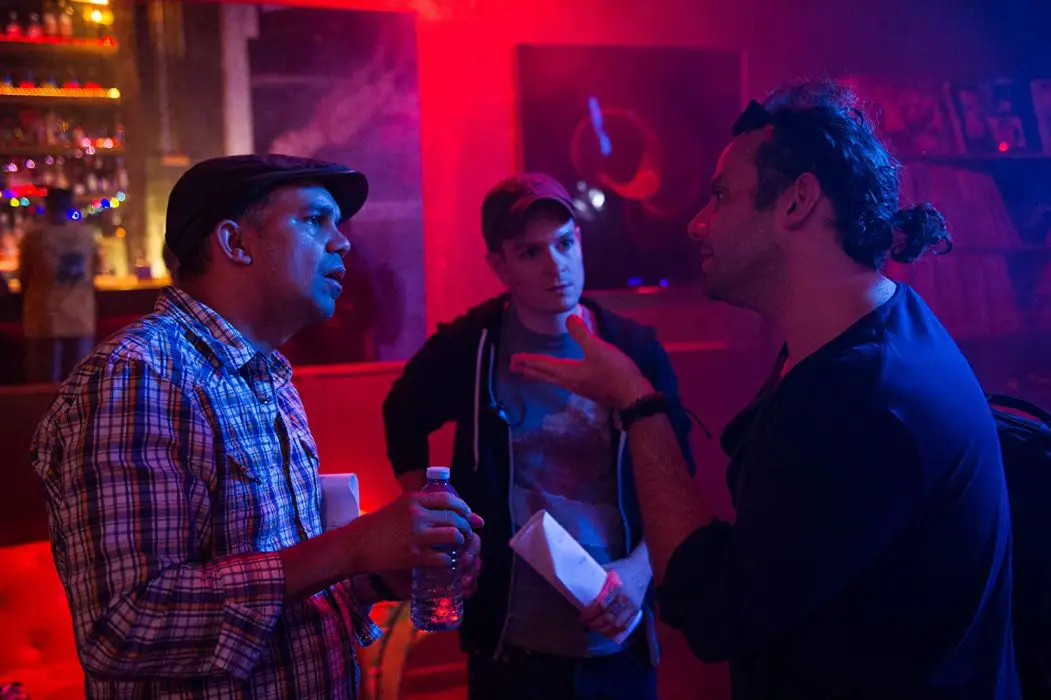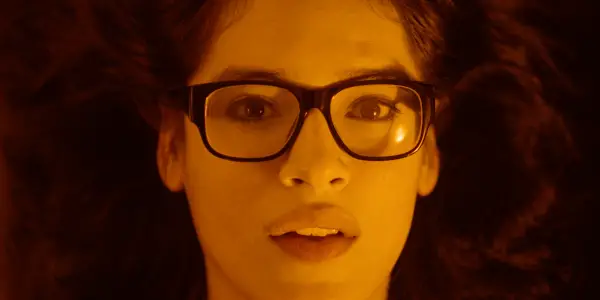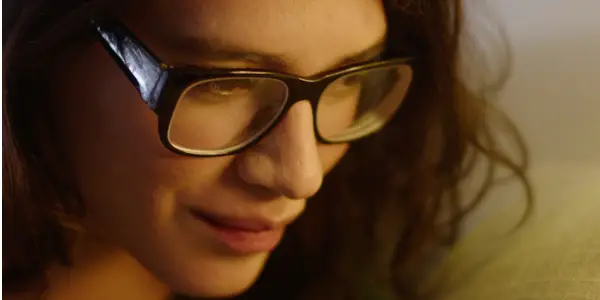Interview: Flavio Alves, Director Of THE GARDEN LEFT BEHIND

Luke Parker is an award-winning film critic and columnist based…
The Garden Left Behind marks gay filmmaker Flavio Alves‘ feature debut, and already, he has established himself as an auteur of influence and truth. Telling a painstaking tale of the plight for normalcy and acceptance, Mr. Alves decided to integrate members of the transgender community throughout his production – not only are the transgender characters on the screen portrayed by transgender actors, but trans men and women also helped formulate and inspire its story and design.
The film, which won an audience award at the 2019 SXSW film festival, follows Tina (Carlie Guevara) as she attempts to navigate through her life in New York City, where she lives with her elderly grandmother (Miriam Cruz). A transgender woman and an undocumented immigrant, Tina is actively seeking the next step of her transition, with the hopes that she may proceed with hormonal therapy. Meanwhile, her commitments to her family, her financial security, as well as her politically-active friends are all toppling over her.
Film Inquiry recently had the opportunity to speak with Flavio Alves about his latest production, as well as the sociopolitical implications of the story, the meaning and significance of his creative and casting decisions, and the universality of the narrative.
This is a very ambitious and contemporary feature debut. As sad as it is, the fact is that there are a lot of overwhelming sociopolitical barriers that make up Tina’s existence. What made you decide to ignite your career with this story?
Flavio Alves: Just like all my films, The Garden Left Behind is about marginalized members of our society. As a gay man and a Latinx filmmaker, I know what it means to be an outsider. At one point in my life, I was undocumented so I felt that it was my responsibility to bring to the forefront stories of people who had been underrepresented on the big screen. But I also made this film because it was an opportunity to increase the trans representation in film – not only with the actresses, but behind the camera in various capacities. We had members of the trans filmmakers project working with us from production assistants to producers. The idea was to provide them with the tools that will, I hope, eventually get them to the director’s chair.
The goal was to bring more young, trans filmmakers to the front of filmmaking. And that’s what I had in mind because visibility is the most important thing for marginalized communities. I grew up in Brazil in the ’80s watching American films and the only time you’d see a gay man or a Latinx playing in an American movie was like a gangster, or someone dying of AIDS. Now that I’m in a position to change the way we tell stories about the LGBTQ community, as well as latinos, I want to do it!

That’s something I appreciated about this film: the representation. Not just in the story itself, but in the production and the people you chose to involve. From what I understand, the film was bred with little more than authenticity and enthusiasm, driven by real accounts from people who wanted to see this film made. Can you touch on the writing process a little bit – where you began and how you developed the story?
Flavio Alves: It doesn’t happen overnight. It doesn’t just happen by calling the trans community and saying, “can I hang out with you for a week?” It happens [over] weeks and months and becoming part of the fabric of their lives. That’s how John Rotondo (co-writer) and I approached it.
It’s almost like making a documentary in a way, because – [though] we knew about that we wanted it to be about an undocumented person, a trans man or a trans woman, we didn’t know the outcome. So, we had to do the investigation. We became detectives, more than a researchers. We had to hang out with [the trans community] to be able to draw them, but it was also a challenge because once you bring members of the trans community in to work with you, you have to be open to challenges. Because they will challenge you; whether they want to make sure you cast the right people to play those parts, but I also made sure that they were on the table to make all kinds of decisions.
It was not an easy process, but I’m glad I did it because I learned so much with them about the struggles the members of the trans community have to go through. And just because I am a gay man myself and I’m a part of this big assembly – a member of the LGBTQ community – it doesn’t give me a blank check to actually write about that. Again, we faced a lot of challenges, but I was glad they brought all those concerns to make sure we got it right.

We’ve seen a lot of transgender films that do not include transgender people. What do you think your decision to include transgender performers adds to your film over other movies that do not?
Flavio Alves: Well, I can’t speak for them and why they make the decision to cast the way they do. Now, I thought that by working with the trans community and involving them in the process, I would have an authentic story. That was the goal. But also, on the other hand, because there are only a few trans actors on the market. I had to, as you probably know, work with a lot of people who had never acted before. That was a great challenge for us…but honestly, I’m not against someone who is a cis man or a cis woman playing a trans role as long as trans men and trans women are given the chance to play cis roles as well…if you’re an actor, you’re an actor.
Talking about the narrative itself, one of the things I really appreciated was that, beyond the transgender narrative and the representation therein, this was also a story about family, it was a story about friends, justice, and even jealousy through the other characters. What sort of challenges did you come across when trying to weave these factors together so that they blended together, rather than intruding on Tina’s overarching tale?
Flavio Alves: The reason for that is very simple: being trans is not everything that Tina is.
Exactly.
Flavio Alves: She’s a best friend. She’s a granddaughter. We always talk about her being trans, but her being a Latina, undocumented, you know, plays a huge role on who she is and the challenges she faces. We tried to check as many boxes as possible: she’s Latina; she’s a trans woman; and also, she lives with her grandma – because most films, they don’t talk about family, which might make people think that [transgender people] don’t have family. So I want that to be in the film…because in the end, she’s the girl sitting on the bus next to you. And that’s how we drew Tina: anybody who has seen this story can connect with her.
We’ve had two sold out screenings, and for the most part, the audience is older white people. Which is interesting. They came to see our film, and it was our opportunity to change hearts and minds and show the story of someone who is so different than you are.

The character and the film itself were very accessible, especially when things turn dark towards the end. In reality, Tina’s story is one that we’re seeing more and more in the news these days. What is it about the art form of cinema that made you think it was the right way to tell Tina’s story?
You know, it’s interesting because the way we made Tina a target [throughout the film], despite the fact that she was trying to live her life just like anyone else. She was looking for financial stability; she was looking for love, all those things.
But, in a different part of the film, we show that violence is always around the corner. For example, when the guy came to buy her car. We see him wearing a hood and coming from the back, he looks like he’s going to attack her. But in the end, he wants to buy her car. I want people in the audience to think, “oh shit, this guy is going to kill her!”
We wanted our audience to feel like something is coming when there’s nothing so they can be with her and understand her position; understand how vulnerable those lives are. That was the whole point about making this film.
[One time] I heard something from a trans woman that I will never forget. She told me that every time she leaves home, she doesn’t know if she’s going to come back. This is something that haunts me every day because I take a lot for granted. I walk down the street, nothing’s going to happen to me. But for trans women, especially trans women of color, anybody can take their lives.Film Inquiry thanks Flavio Alves for taking the time to talk with us.
The Garden Left Behind is currently seeking distribution.
https://youtu.be/9u633bgbihU
Does content like this matter to you?
Become a Member and support film journalism. Unlock access to all of Film Inquiry`s great articles. Join a community of like-minded readers who are passionate about cinema - get access to our private members Network, give back to independent filmmakers, and more.
Luke Parker is an award-winning film critic and columnist based in the Baltimore-Washington metropolitan area. As an entertainment journalist, he has interviewed several members of the film industry and participated in some of its most prestigious events as a member of the press. Currently, he is working to obtain his bachelor’s degree in Mass Communication at Towson University.













